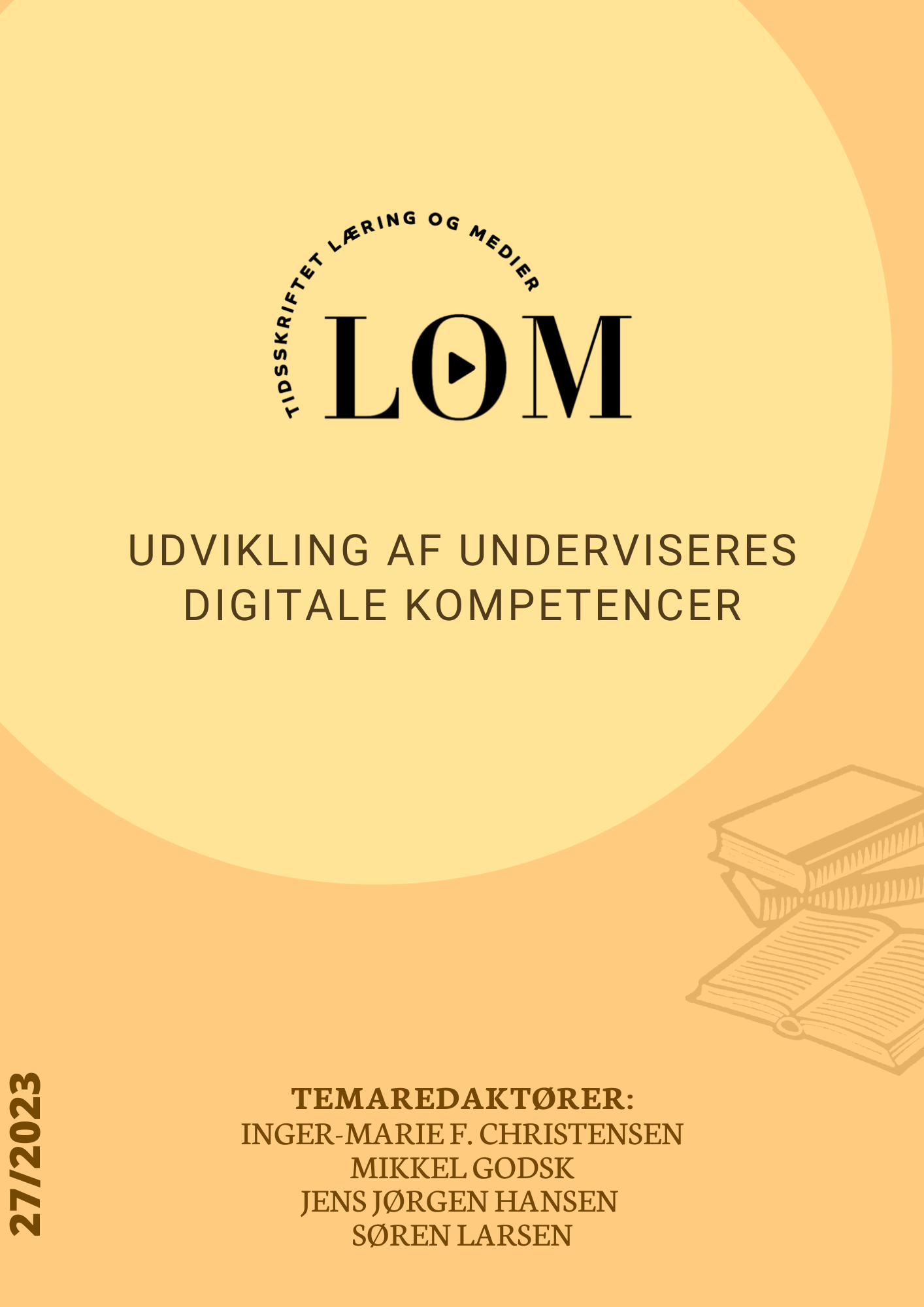Underviseres digitale undervisningskompetencer post-corona
DOI:
https://doi.org/10.7146/lom.v15i27.134150Abstract
Digitale teknologier antages at kunne understøtte universitetsstuderendes læring. Dette fokus manifesterer sig ligeledes i universitetsstrategier, hvor der opstilles mål om, at digitale teknologier bruges til at støtte de studerendes læring. Dette stiller krav til underviseres digitale undervisningskompetencer. I denne artikel formidles et forskningsprojekt, der har til formål at undersøge, om undervisere post-corona har de nødvendige digitale undervisningskompetencer til at støtte universitetsstuderendes læring. Artiklen formidler de centrale fund fra et mixed methods studie på et dansk universitet med 399 respondenter. Vi finder, at undervisere føler sig fortrolige med onlineundervisning, men at de kun i mindre grad benytter sig af studentercentrede undervisningselementer i praksis. Vi konkluderer, at der er behov for fortsat kompetenceudvikling, og at udviklingen af kompetencer er særlig afhængig af praktisk erfaring, herunder dialog med kolleger og studerende. Endvidere er der behov for at identificere og udvikle viden om, hvordan og hvorvidt underviseres sanseinput kan understøttes online.
Downloads
References
Aagaard, T., & Lund, A. (2019). Digital agency in higher education: Transforming teaching and learning. Routledge.
Balslev, J., & Riis, S. (2021). The digital potential: a monstrous composite? In Technology Assessment in Techno-Anthropological Perspective (pp. 127-151). Aalborg Universitetsforlag.
Bower, M. (2008). Affordance analysis–matching learning tasks with learning technologies. Educational Media International, 45(1), 3-15.
Chen, M. (2022). Digital affordances and teacher agency in the context of teaching Chinese as a second language during COVID-19. System, 105, 102710.
Christensen, I.-M. F., Hansen, P. S., & Kjær, C. (2019). Den blendede undervisers roller og kompetencer. Tidsskriftet Læring og Medier (LOM), 12(22).
Christensen, M. K., Nielsen, K.-J. S., & O’Neill, L. D. (2022). Embodied teacher identity: a qualitative study on ‘practical sense’as a basic pedagogical condition in times of Covid-19. Advances in Health Sciences Education, 1-27.
Commission, E., Centre, J. R., & Redecker, C. (2017). European framework for the digital competence of educators : DigCompEdu. Publications Office. https://doi.org/doi/10.2760/159770
Damşa, C., & de Lange, T. (2019). Student-centred learning environments in higher education. Uniped, 42(01), 9-26.
Edwards, A. (2005). Relational agency: Learning to be a resourceful practitioner. International journal of educational research, 43(3), 168-182.
Ehrlinger, J., & Dunning, D. (2003). How chronic self-views influence (and potentially mislead) estimates of performance. Journal of personality and social psychology, 84(1), 5.
Ellis, R. A., Steed, A. F., & Applebee, A. C. (2006). Teacher conceptions of blended learning, blended teaching and associations with approaches to design. Australasian Journal of Educational Technology, 22(3).
Facer, K., & Selwyn, N. (2021). Digital Technology and the Futures of Education: Towards ‘Non-Stupid’Optimism.
Foschi, M. (1996). Double standards in the evaluation of men and women. Social Psychology Quarterly, 237-254.
Gelman, A., & Hill, J. (2006). Data analysis using regression and multilevel/hierarchical models. Cambridge university press.
Godsk, M. (2021). Coronapandemiens indflydelse på universitetsadjunkters holdning til teknologi i undervisningen. Tidsskriftet Læring og Medier (LOM), 14(24).
Godsk, M., Kristiansen, B., & Møller, K. L. (2021). Digital læringsteknologis potentiale for studerendes engagement (Pædagogisk indblik, Issue. A. Universitetsforlag.
Hamilton, E. R., Rosenberg, J. M., & Akcaoglu, M. (2016). The substitution augmentation modification redefinition (SAMR) model: A critical review and suggestions for its use. TechTrends, 60(5), 433-441.
Jisc. (2020). Applying the SAMR model to aid your digital transformation. https://www.jisc.ac.uk/guides/applying-the-samr-model
Kennedy, M. M. (2016). How Does Professional Development Improve Teaching? Review of Educational research, 86(4), 945-980.
Koehler, M., & Mishra, P. (2009). What is technological pedagogical content knowledge (TPACK)? Contemporary issues in technology and teacher education, 9(1), 60-70.
Lauridsen, O. (2016). Hjernen og læring. Akademisk forlag.
Lillejord, S., Børte, K., Nesje, K., & Ruud, E. (2018). Learning and teaching with technology in higher education - a systematic review. K. C. f. Education.
Noel, J. (1999). On the varieties of phronesis. Educational philosophy and theory, 31(3), 273-289.
Puentedura, R. (2010). SAMR and TPCK: Intro to advanced practice. In.
Salmon, G. (2004). E-moderating: The key to teaching and learning online. Psychology Press.
Small, M. L. (2011). How to conduct a mixed methods study: Recent trends in a rapidly growing literature. Annual review of sociology, 37, 57-86.
Syvertsen, T., & Enli, G. (2020). Digital detox: Media resistance and the promise of authenticity. Convergence, 26(5-6), 1269-1283.
Tseng, J.-J., Chai, C. S., Tan, L., & Park, M. (2020). A critical review of research on technological pedagogical and content knowledge (TPACK) in language teaching. Computer Assisted Language Learning, 1-24.
Yeh, Y.-F., Chan, K. K. H., & Hsu, Y.-S. (2021). Toward a framework that connects individual TPACK and collective TPACK: A systematic review of TPACK studies investigating teacher collaborative discourse in the learning by design process. Computers & Education, 171, 104238.
Ex. referencer, hvor forfatterne indgår
Downloads
Published
How to Cite
Issue
Section
License
Copyright (c) 2023 Maria Hvid Stenalt, Liv Nøhr, Emil Bøgh Løkkegaard, Helle Mathiasen

This work is licensed under a Creative Commons Attribution-NonCommercial-NoDerivatives 4.0 International License.

Articles published in the Journal of Learning and Media are licensed under a Creative Commons Attribution-NonCommercial-NoDerivatives 3.0 Unported Licens.
Authors retain copyright and grant the journal right of first publication; simultaneously articles are licensend under the Creative Commons Attribution license: Attribution-NonCommercial-NoDerviatives (by-nc-nd). Read about this license at https://creativecommons.org/licenses/by-nc-nd/3.0/
---
At LOM.dk, you will also find articles from the discontinued Journal for the Continuing and Further Education of the Danish Universities (UNEV). Note that special rules apply to UNEV articles:
It is the authors and any other copyright holder who have the copyright of articles published under the auspices of UNEV, and access to the articles is contingent on users acknowledging and complying with the associated legal guidelines:
- Users may download and print one copy of any UNEV publication for private studies or research.
- The redistribution of articles or the use of these for revenue-funded activities or commercial purposes are not allowed.
- It is not allowed to distribute the URLs of UNEV articles.


